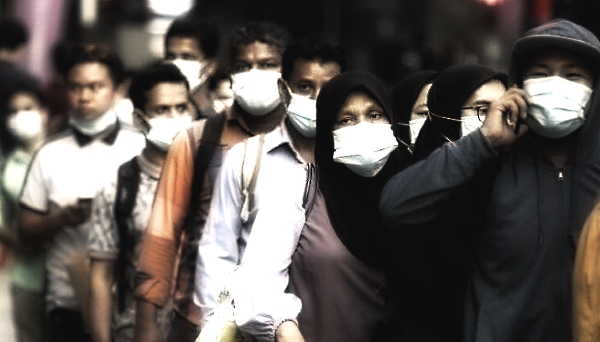Sin Chew Daily
Health minister Adham Baba said he had proposed to the prime minister to extend the RMCO which will end on August 31, until the coronavirus pandemic is completely under control.
How are we going to define that the outbreak is "under control"? If we judge merely by the numbers, indeed the coronavirus outbreak in this country is basically under control, and to the WHO, we are actually among the "star performers" in virus containment.
As of August 23, the country has confirmed a cumulative total of 9,267 positive COVID-19 cases, with only 125 deaths and a recovery rate of 96.7%. Only 28 out of 100,000 people have been infected.
On the contrary, the situation remains bad elsewhere in the world with 23.5 million infections and 810,000 deaths reported so far. The number of infections grows by five million cases every 20 days with a recovery rate of only 68%, and 307 infections out of every 100,000 people.
Indeed, judging from these figures, Malaysia has performed exceptionally well, but this has been achieved at a price!
Malaysians have to sacrifice some of their freedoms while companies are losing big chunks of their businesses. In the days to come, we still have to face the bitter consequences of economic recession and fast rising unemployment.
Bank Negara reported that the country's second quarter GDP shrank by a whopping 17% while AmBank Group Research said the unemployment rate this year could hit 6.0% or higher. These two figures are far more staggering than during the 1998 global financial crisis.
If the RMCO were to be extended beyond this month, the virus could be better controlled but this is done at the expense of the economy and many people may be thrown out of job!
Minister in the PM's department Mohd Redzuan Md Yusof has forewarned that the government may tighten the already relaxed SOPs and increase the fines. This means companies which have looked to the resumption of their businesses from September 1 may have to prepare to wind up soon.
Perhaps we should ponder the question whether we want to fully control the spread of the virus more, or put the economy back on the track of growth.
The government should hold cross-department meetings to strike a balance between containing the virus and reviving the national economy. While the PM is making the decision to extend the RMCO, he should also take into account the damages anti-virus policies could do to the economy.
Our problem now is: while we have imposed very strict SOPs to battle the virus, enforcement is lax and selective. If senior government officials can be spared from the penalties of not complying with SOPs, how can we convince the public that they must strictly adhere to the SOPs?
We have earlier seen foreign minister Hishammuddin Hussein vaping in the Parliament House, and now plantation industries and commodities minister Mohd Khairuddin walking free without wearing a quarantine wristband after returning from Turkey.
Does that mean these minsters are above the law and can do anything they like?
Majority of Malaysians have complied with the SOPs during the RMCO: put on face masks in public and have their temperatures taken. Unfortunately, those put on house quarantine orders have blatantly flouted the rules, roaming about freely with their wristbands on.
Because of these irresponsible people, Malaysians returning from overseas after July 25 will have to be quarantined at hotels or designated quarantine centers at own cost!
These people are far more dangerous than drunk drivers, as they may spread the virus to the public. Heavier fines and jail sentences must be meted out to them in addition to the medical bills of people infected by them directly or indirectly.
According to the WHO, the pandemic will only be fully controlled in two years' time. We feel that it may be very difficult for the national economy and corporate sector to weather such a long wait.
As such, we need to have a more clear-cut definition of putting the virus "under control". For example, a recovery rate above 95%, or fewer than 500 active cases, or fewer than 30 new cases daily, instead of insistence on zero new infection over a specific period of time.

ADVERTISEMENT
ADVERTISEMENT


































